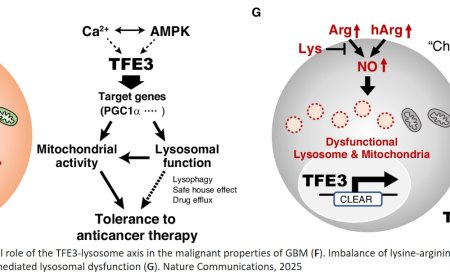A key gene complex promotes blood cancer growth

Researchers used an innovative genome-wide screening approach to identify genes, and their encoded proteins, that play critical roles in the prevention of lymphoma development, revealing new potential treatment targets for these blood cancers.
The study, published in Nature Communications, has identified a group of proteins known as the GATOR1 complex as essential tumor suppressors.
The GATOR1 complex (NPRL3, DEPDC5, NPRL2) normally functions as a ‘brake’ on cellular growth by regulating pathways that control cell growth and metabolism. When GATOR1 components are lost or defective, this protective mechanism fails, allowing cells to grow uncontrollably.
The team utilized sophisticated pre-clinical models of aggressive lymphoma to systematically test the function of all known genes in this complex. Their comprehensive screening approach revealed that when any of the GATOR1 genes are lacking, c-MYC-driven lymphoma development is dramatically accelerated, identifying the GATOR1 complex as a crucial suppressor of blood cancer development.
They also demonstrate that MYC-driven lymphomas lacking GATOR1 display constitutive mTOR pathway activation and are highly sensitive to mTOR inhibitors, both in vitro and in vivo.
Co-lead author said: “The best thing about performing a well-designed CRISPR screen is that you will always find something.
“Our unbiased screening approach looked at all genes, rather than just a subset of them. By not limiting our investigation to known pathways, we found expected as well as unexpected tumor suppressor genes and pathways, such as GATOR1.”
Strikingly, existing drugs that target the same cellular pathways that GATOR1 typically controls were highly effective at slowing the growth of lymphomas in GATOR1-deficient pre-clinical models.
These drugs have previously had limited success in cancer treatment, and this may be because researchers have not been able to identify which patients would respond well to these therapeutics.
“Our paper begins the exploration into this precision medicine opportunity,” shared the author.
https://www.nature.com/articles/s41467-025-62615-y
https://sciencemission.com/GATOR1-complex-as-a-tumor-suppressor












